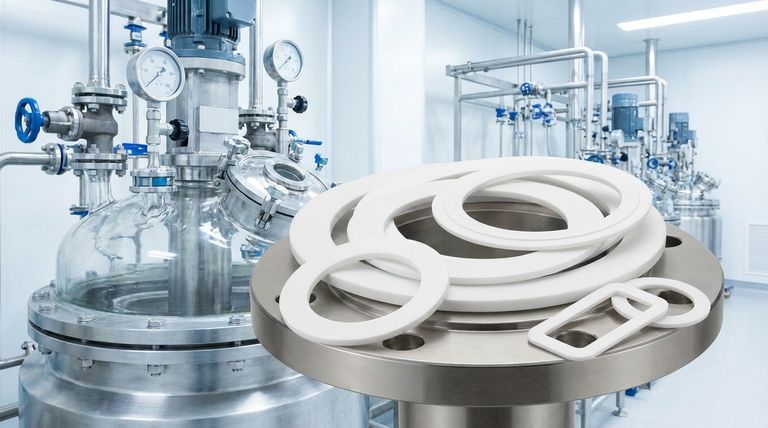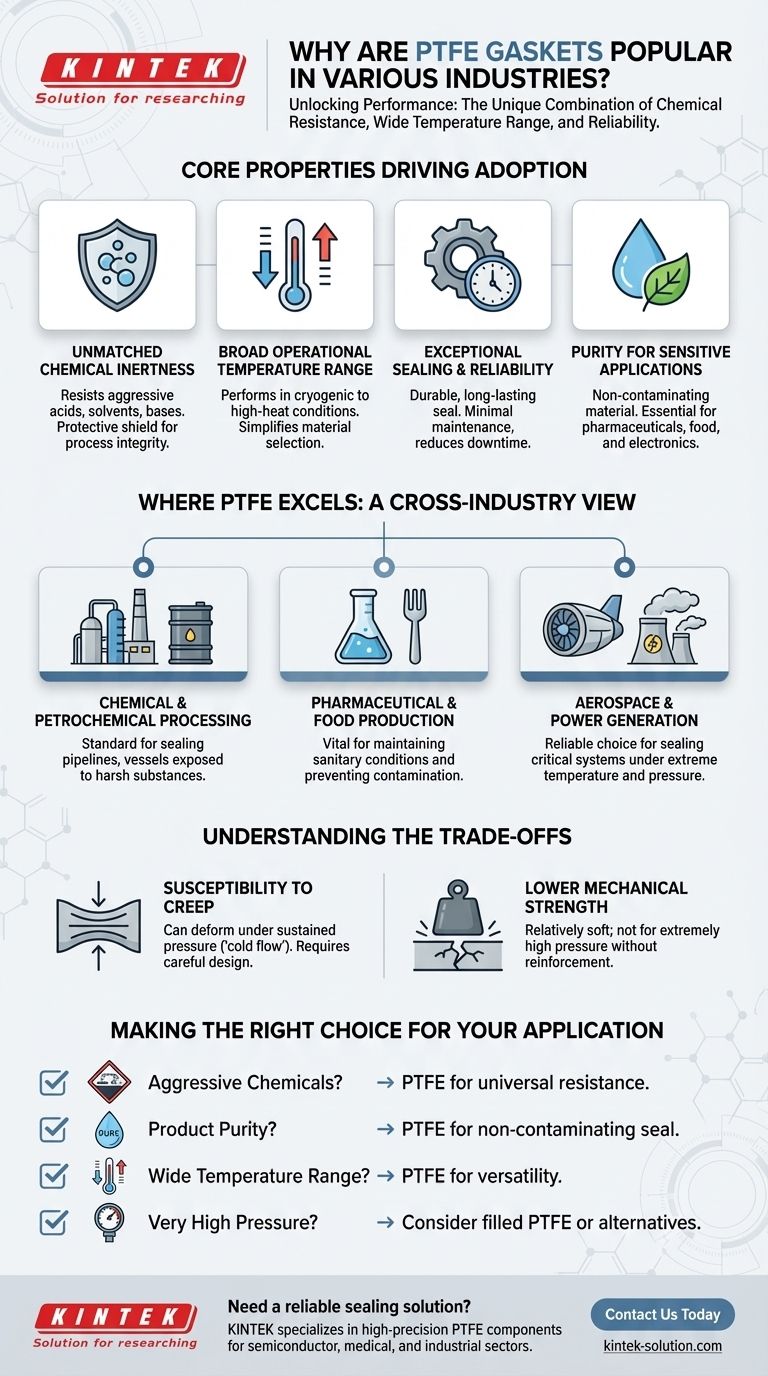At the core of their popularity, Polytetrafluoroethylene (PTFE) gaskets are valued for their unique and powerful combination of properties. They offer exceptional chemical resistance, operate across a vast range of temperatures, and provide reliable, low-maintenance sealing, making them a cost-effective solution for many demanding industrial applications.
The widespread adoption of PTFE gaskets is not due to a single feature, but rather their versatility. They solve the critical engineering challenge of creating a durable, non-contaminating seal in environments where most other materials would quickly degrade or fail.

The Core Properties Driving Adoption
To understand why PTFE is a go-to material, we must first look at its fundamental characteristics. These properties work in concert to deliver performance that is difficult to match.
Unmatched Chemical Inertness
PTFE is famously non-reactive. It can withstand exposure to the most aggressive acids, solvents, and bases without degrading, which is critical for safety and process integrity in chemical plants.
This inertness acts as a protective shield for the flange connection, preventing corrosive media from escaping and ensuring the purity of the product within the system.
A Broad Operational Temperature Range
Few materials can perform reliably in both cryogenic conditions and high-heat applications. PTFE maintains its sealing capability across an exceptionally wide temperature spectrum.
This versatility simplifies material selection for engineers designing systems that experience significant temperature fluctuations.
Exceptional Sealing and Reliability
PTFE gaskets provide a durable, long-lasting seal with minimal maintenance requirements. Their reliability reduces costly downtime and the risk of hazardous leaks in critical infrastructure like pipelines, pumps, and valves.
The ease of installation further contributes to their cost-effectiveness over the lifecycle of the equipment.
Purity for Sensitive Applications
In industries like pharmaceuticals, food and beverage, and electronics, preventing contamination is non-negotiable. PTFE is an inherently pure material that does not leach chemicals into the process media.
This ensures that the final product, whether it's a life-saving drug or a food ingredient, remains uncontaminated and safe for consumption.
Where PTFE Excels: A Cross-Industry View
The unique properties of PTFE make it an indispensable component across a vast array of industries, each leveraging its specific strengths.
For Chemical and Petrochemical Processing
In these environments, equipment is constantly exposed to harsh and corrosive substances. PTFE gaskets are the standard for sealing pipelines and vessels containing these aggressive chemicals, ensuring operational safety and environmental protection.
For Pharmaceutical and Food Production
The primary driver here is purity. PTFE's inert nature ensures that it will not react with or contaminate sensitive products, making it a vital material for maintaining sanitary processing conditions.
For Aerospace and Power Generation
These sectors often involve extreme temperatures and pressures. PTFE's ability to withstand these conditions makes it a reliable choice for sealing critical systems, from fuel lines to steam pipes.
Understanding the Trade-offs
While incredibly versatile, PTFE is not a universal solution. An objective assessment requires understanding its limitations.
Susceptibility to Creep
PTFE's most significant drawback is creep, or "cold flow." Under sustained pressure from flange bolts, the material can slowly deform, potentially leading to a loss of sealing pressure over time. This requires careful design and sometimes periodic re-torquing.
Lower Mechanical Strength
Compared to metallic or semi-metallic gaskets, pure PTFE is a relatively soft material. It is more susceptible to damage from over-tightening and is not suitable for extremely high-pressure applications without reinforcement.
The Cost-Effectiveness Context
While the references note its cost-effectiveness, this is relative. Its true value is realized in applications where cheaper elastomers would fail quickly, leading to frequent replacement and downtime. In these harsh environments, PTFE's longevity makes it the more economical choice.
Making the Right Choice for Your Application
Selecting the right gasket material is a critical decision that impacts safety, efficiency, and cost. Use these points as a guide for your specific needs.
- If your primary focus is handling aggressive chemicals: PTFE is often the default choice due to its near-universal chemical resistance.
- If your primary focus is product purity for food or pharmaceuticals: PTFE's inert, non-contaminating nature makes it an essential sealing material.
- If your primary focus is a wide temperature range: PTFE's ability to perform in both cryogenic and high-heat conditions offers unmatched versatility.
- If your primary focus is very high pressure with heavy bolt loads: Be cautious of creep and consider filled PTFE variants or alternative materials designed for higher mechanical stress.
Understanding these core strengths and limitations allows you to leverage PTFE gaskets for maximum safety, reliability, and operational efficiency.
Summary Table:
| Key Property | Benefit | Ideal For |
|---|---|---|
| Chemical Inertness | Resists aggressive acids, solvents, and bases | Chemical processing, petrochemical |
| Wide Temperature Range | Performs from cryogenic to high heat | Aerospace, power generation |
| High Purity | Non-contaminating, safe for sensitive products | Pharmaceutical, food & beverage |
| Low Maintenance | Durable seal, reduces downtime | Industrial pumps, valves, pipelines |
Need a reliable sealing solution for your demanding application? KINTEK specializes in manufacturing high-precision PTFE components—including seals, gaskets, liners, and labware—for the semiconductor, medical, laboratory, and industrial sectors. Our custom fabrication services, from prototypes to high-volume orders, ensure you get a gasket that meets your exact requirements for chemical resistance, temperature stability, and purity. Contact us today to discuss how our PTFE solutions can enhance your operational safety and efficiency!
Visual Guide

Related Products
- Custom PTFE Parts Manufacturer for Teflon Parts and PTFE Tweezers
- Custom PTFE Parts Manufacturer for Teflon Containers and Components
- Customizable PTFE Seals Filter Holders for Versatile Applications
- Custom PTFE Sealing Tapes for Industrial and High Tech Applications
- Custom PTFE Sleeves and Hollow Rods for Advanced Applications
People Also Ask
- What factors should be considered when choosing between NBR and PTFE seat materials for butterfly valves?
- How do PTFE-lined valves benefit the environment? Prevent Pollution and Reduce Waste
- What are some specialized industrial applications of guide rings? Essential Uses for Oil-Free and High-Load Systems
- What factors should be considered when selecting PTFE lip seals? Ensure Long-Term Reliability in Demanding Applications
- How should one choose the right type of PTFE gasket? A Guide to Optimal Seal Performance
- What are the main components of a PTFE sliding pad? A Simple Two-Part System for Low-Friction Movement
- What are the characteristics of graphite filled PTFE? Enhance Wear Resistance & Self-Lubrication
- What are the properties and uses of carbon-filled PTFE? Enhance Wear Resistance & Conductivity



















